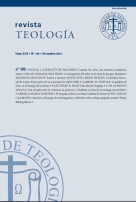Por favor, use este identificador para citar o enlazar este ítem:
https://repositorio.uca.edu.ar/handle/123456789/7586| Campo DC | Valor | Lengua/Idioma |
|---|---|---|
| dc.contributor.author | Anaya, Luis Alfredo | es |
| dc.date.accessioned | 2019-06-20T00:24:50Z | - |
| dc.date.available | 2019-06-20T00:24:50Z | - |
| dc.date.issued | 2012 | - |
| dc.identifier.citation | Anaya, Luis Alfredo., Una mirada sobre la violencia, la pobreza y el hábitat a la luz de la teología moral filial [en línea]. Teología, 109 (2012) Disponible en: https://repositorio.uca.edu.ar/handle/123456789/7586 | es |
| dc.identifier.issn | 0328-1396 | - |
| dc.identifier.uri | https://repositorio.uca.edu.ar/handle/123456789/7586 | - |
| dc.description.abstract | Resumen: Desde la perspectiva de la teología moral filial, se ensaya en el artículo una respuesta concreta a algunos problemas sociales emergentes en América Latina, como son la violencia, la pobreza y el hábitat del hombre. La mirada filial, que para el análisis toma consistencia bíblica en algunos textos paulinos, permite considerar de una manera nueva dichos conflictos, relevando de modo más claro su dramaticidad y condición denigrante, pero pergeñando también el camino de una respuesta cristiana y humana. En efecto, cuando el desorden social puede ceñirse teológicamente y este núcleo se focaliza en la negativa del hombre a reconocer el lugar de Dios y, en consecuencia, el lugar del hombre, la respuesta adecuada y eficaz es promover políticamente el que cada uno ocupe el lugar propio como miembro vivo del Cuerpo de Cristo. En definitiva, y es tarea propia del bien común, el empeño social es procurar las condiciones para realizar, en la existencia social, la verdad filial y fraterna. | es |
| dc.description.abstract | Abstract: This article aims at seeking an answer to some emerging social problems in Latin America, such as violence, poverty and human habitat, from the perspective of filial moral theology. This perspective –founded on the Pauline doctrine- facilitates a new look at these problems; it clarifies their intricacy and denigrating condition and paves the way towards a Christian and human answer. In fact, when social disorder is theologically constrained and its core focuses on the reluctance of men to acknowledge the place of God, and therefore their own place, the accurate answer is to politically promote the place of each human being as a living member of the body of Christ. In sum, as a challenge to the common good, the social task is to create the conditions under which the filial and fraternal truth can be achieved. | es |
| dc.format | application/pdf | es |
| dc.language.iso | spa | es |
| dc.publisher | Universidad Católica Argentina. Facultad de Teología | es |
| dc.rights | Acceso Abierto | es |
| dc.rights.uri | https://creativecommons.org/licenses/by-nc-sa/4.0/ | es |
| dc.source | Teología, 109 | es |
| dc.source | ISSN 0328-1396 | es |
| dc.subject | TEOLOGIA MORAL | es |
| dc.subject | POBREZA | es |
| dc.subject | VIOLENCIA | es |
| dc.subject | DOCTRINA SOCIAL DE LA IGLESIA | es |
| dc.subject | FILIACION | es |
| dc.subject | FRATERNIDAD | es |
| dc.subject | HABITAT | es |
| dc.title | Una mirada sobre la violencia, la pobreza y el hábitat a la luz de la teología moral filial | es |
| dc.type | Artículo | es |
| uca.path | Teología|2012 Tomo XLIX nº 109 | es |
| uca.disciplina | TEOLOGIA | es |
| uca.filename | /home/data-uca-generic/folder_revistas/Revistas varias/Teologia/109/mirada-violencia-pobreza-habitat-teologia/metadata.xml | es |
| uca.issnrd | 1 | es |
| uca.affiliation | Fil: Anaya, Luis Alfredo. Pontificia Universidad Católica Argentina. Facultad de Derecho; Argentina | es |
| uca.orden | 07 | es |
| uca.version | publishedVersion | es |
| item.grantfulltext | open | - |
| item.languageiso639-1 | es | - |
| item.fulltext | With Fulltext | - |
| Aparece en las colecciones: | TEO - 2012 Tomo XLIX nro. 109 | |
Ficheros en este ítem:
| Fichero | Descripción | Tamaño | Formato | |
|---|---|---|---|---|
| mirada-violencia-pobreza-habitat-teologia.pdf | 249,72 kB | Adobe PDF |  Visualizar/Abrir |
Visualizaciones de página(s)
161
comprobado en 30-abr-2024
Descarga(s)
165
comprobado en 30-abr-2024
Google ScholarTM
Ver en Google Scholar
Este ítem está sujeto a una Licencia Creative Commons

